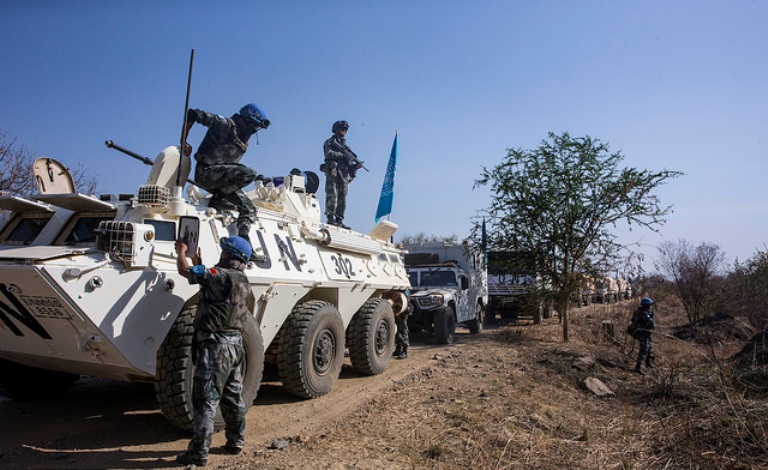UN peacekeeping chief reiterates reservations over IGAD force for South Sudan

December 18, 2018 (WASHINGTON) – Jean-Pierre Lacroix, Under-Secretary-General for Peacekeeping Operations Tuesday reiterated his reservations towards the 1700 troops that IGAD intends to deploy in South Sudan under the banner of the UN Mission in South Sudan.
In a regular briefing to the United Nations Security Council Tuesday, Lacroix said the security situation in South Sudan has significantly improved since the signing of the revitalized peace agreement four months ago, on 12 December 2018.
But he pointed to the slow pace of the implementation of pre-transitional measures and called to finalize security arrangements warning that the peace implementation process remains fragile and not yet irreversible.
Regarding the IGAD force, he told the Security Council that before to reconfigure the UNMISS and integrate the east African bloc’s troops in the Regional Protection Force, the South Sudanese peace partners must first agree on the “transitional security arrangements including a clear definition of the tasks that UNMISS would need to perform”.
The head of the peacekeeping operations also said the primary mission of the UNMISS should remain the protection of civilians particularly under the current difficult humanitarian situation in South Suda.
“Additional tasks that UNMISS could be asked to perform to support the peace process should not be at the operational or political cost of performing its protection functions,” said Lacroix referring to the IGAD decision to deploy troops in South Sudan during the transitional period to protect the opposition leaders in return for their acceptance of the immediate unification of troops.
He also stressed that the “Unity of command within all Blue Helmets cannot be compromised,” before to recall that the troop-contributing countries (TCCs) must “satisfy UN standards in terms of training, equipment, human rights vetting, and political neutrality and impartiality”.
Ethiopia which is a non-permanent member of the UN Security Council is tasked with the submission of the IGAD proposal to deploy the 1695 troops. Lacroix said they learnt that the proposal would be submitted soon to the 15-member body.
The IGAD force will be composed of four hundred ninety-nine (499) each from Kenya, Uganda, and Sudan, and ninety-nine (99) each from Somalia and Djibouti.
On 22 November 2018, UNMISS head David Shearer told reporters in Juba that with the 14500 troops they have in South Sudan, they can fulfil their mandate in term of protection of civilians and aid workers.
“But, as I say, we’ve got a large number of troops here already and what we would like to do is to make sure that they are used efficiently in the work of building a durable peace,” stressed Shearer.
PROCESS REMAINS FRAGILE AND NOT YET IRREVERSIBLE
Lacroix told the Security Council sporadic clashes continue to take place in South Sudan and there are serious concerns about the attacks against civilians that continue to occur in the country as it was illustrated by the recent sexual attacks outside Bentinu last November.
The French diplomat underscored the slow pace in the implementation process, saying the optimism generated by the return of many enforcement mechanisms to Juba is mitigated by “their delays and the lack of substantive discussions so far”.
The National Pre-Transitional Committee (NPTC), which is entrusted with the oversight and coordination of the implementation process has met, but most recently failed to achieve a quorum. The Independent Boundary Commission is yet to meet, he said.
Also, he said the security committees have made little visible progress as their discussions mainly focusing on troops cantonment, their sustainment and the subsequent reintegration “rather than a more holistic approach to security sector reform focusing on the requirements for a national army”.
After making this four-month audit, the U.N.’s head of peacekeeping operations emphasized the need to agree on a comprehensive agreement on the security sector and on the establishment of transitional security arrangements.
“This is necessary to build confidence among the parties and ensure the return and permanent presence of all the opposition in Juba” by the end of May before the end of the pretransitional period in May 2019.
He also called to appoint a new chair of the Joint Monitoring and Evaluation Commission (JMEC) to “shepherd these critical pre-transition negotiations and bring the architecture of the peace process to start substantive political preparations for the transition”.
(ST)
